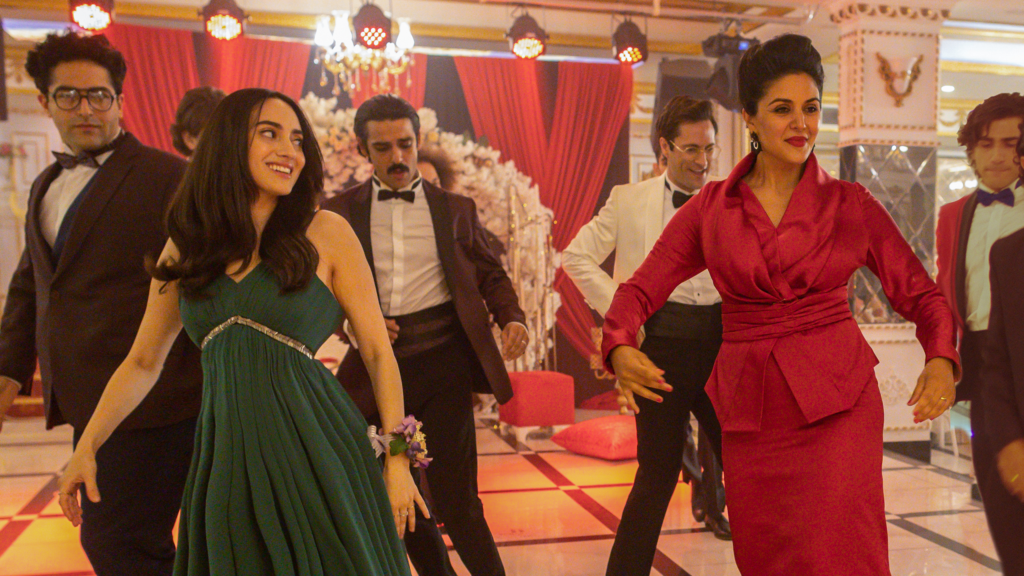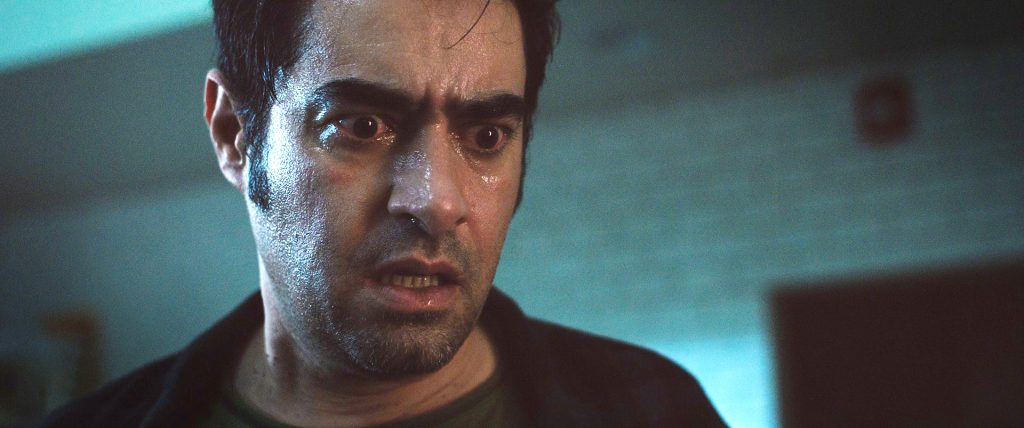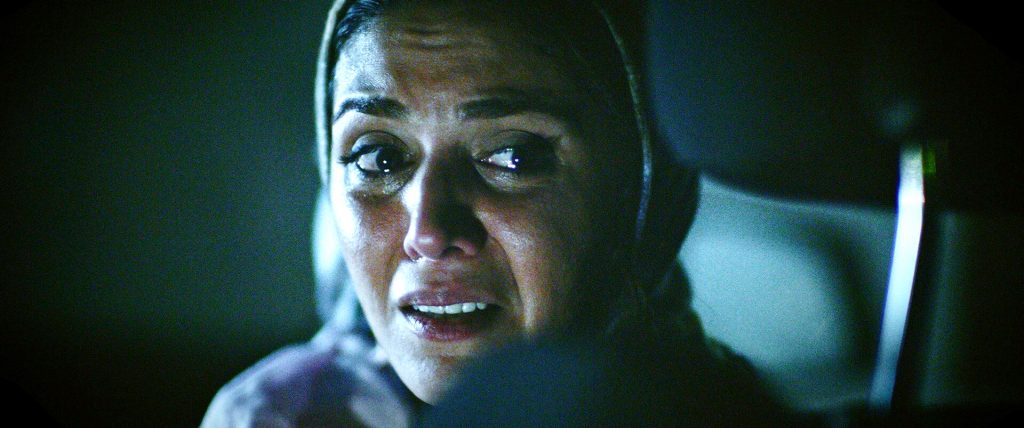February 11, 2023
by Carla Hay

Directed by Maryam Keshavars
Some language in Persian with subtitles
Culture Representation: Taking place in New York City and in Iran, from the 1960s to the 2000s, the comedy/drama film “The Persian Version” features a predominantly Asian cast of characters (with some white people) representing the working-class and middle-class.
Culture Clash: A free-spirited queer woman, who feels like a misfit in her mostly male family that’s headed by conservative Iranian immigrant parents, comes to terms with her identity and how her parents’ past had an effect on the family.
Culture Audience: “The Persian Version” will primarily appeal to people interested in movies about immigrant experiences and intergenerational relationships of family members.

Most of “The Persian Version” is a sharp and witty tale of an Iranian American woman navigating two ethnicities and her family issues. The movie’s last 20 minutes resemble a formulaic TV sitcom. It doesn’t ruin the movie, but it lowers the movie’s quality. Even with its flaws, “The Persian Version” is a unique and vibrant story that shows perspectives that are rarely seen in American-made feature films.
Written and directed by Maryam Keshavars, “The Persian Version” is a comedy/drama inspired by Keshavars’ real-life experiences as the lesbian child of Iranian parents who immigrated to the United States in the late 1960s. “The Persian Version” had its world premiere at the 2023 Sundance Film Festival, where it won two prizes: the Audience Award for U.S. Dramatic Feature and the Waldo Salt Screenwriting Award. The movie features frequent voiceover narration from the movie’s fast-talking and sarcastic protagonist named Leila Jamshidpour (played by Layla Mohammadi), who is in her 30s when the movie begins in New York City in the 2000s.
“The Persian Version” also has several flashbacks throughout the story, going all the way back to the early 1960s, when Leila’s parents were living in Iran. The family moved to the United States in 1967. The Iranian Revolution (also known as Islamic Revolution) began in 1977, and ended in 1979, with the overthrow of the Pahlavi dynasty. It ushered in a new era of Iran being a republic but also increased Iran’s political tensions with the U.S., especially when 52 Americans were held as hostages for two months, beginning in November 1979.
The opening scene of “The Persian Version” takes place shortly after Leila has won the prize for Best Costume at a Halloween party, for wearing a burka-bikini combination costume dressed as a fictional character named Miss Burkatini. While still in costume, Leila is hooking up in a bedroom with a British man dressed as transgender female singer Hedwig from the award-winning musical “Hedwig and the Angry Inch.” The name of Leila’s sex partner is Maximillian Balthazar (played by Tom Byrne), who identifies as a cisgender heterosexual male. Maximilian is dressed in this costume because he’s an actor, and this is the costume he wears as the star of the Broadway production of “Hedwig and the Angry Inch.”
Viewers soon learn that Leila identifies as a queer woman who is mainly attracted to other cisgender women. What is she doing hooking up with Maximillian? She says that men who look like drag queens “turn her on.” She’s also very drunk and horny at the moment. Leila expects that this sexual encounter with Maximilian will be a one-night stand and that they probably won’t see each other again. She’ll find out later that she was wrong about this assumption.
During this hookup, Leila looks up and speaks directly to the camera, as she frequently does throughout the movie. She then gives a monologue which is a quick summary of her life so far, accompanied by a montage of flashbacks. This intriguing monologue will hook viewers right away to find out more about Leila.
In this opening monologue, Leila says: “Obviously, I have some issues with culture. But can you blame me? I come from two countries [Iran and the United States] that used to be madly in love with each other. And like every great romance, it ended in a bitter divorce.
Leila continues, “Like a child of divorce, I was right in the middle, being pulled at it from both sides. Being a girl, I couldn’t be drafted into the Iranian military. So, I was the only child in my family who could travel between the two countries—these two parents who wanted each other dead: Iran and America.”
Leila adds, “I never fit in anywhere. Unresolved childhood trauma: Clearly this neurosis led me to become a writer. Free therapy. Writers and neurosis: What’s more New York than that?” It’s mentioned shortly thereafter that Leila is also an independent filmmaker.
The movie then shows Leila describing her immediate family members. Her retired obstetrician/gynecologist father Ali Reza (played by Bijan Daneshmand) and her mother Shirin (played by Niousha Noor), who is a powerhouse real-estate agent, are strict Muslims who have conservative views of how people should conduct their personal lives. Leila has a particularly rocky relationship with Shirin, who seems to think that Leila is a wayward child who always manages to cause problems for herself.
Leila, who calls herself the “outsider of the family,” has eight brothers. She describes each of them in a few words. Shivaz (played by Samuel Tehrani), the eldest child, is the “disco king.” Vahid (played by Parsa Kaffash) is the “troublemaker.” Majid (played by Arty Froushan), who is a medical doctor, is like “JFK Jr., minus the plane crash.” Hamid (played by Reza Diako) is the “brainiac.” Eman Zaman (played by Andrew Malik) is the “Goth.” Rostam (played by Kamyab Falahati) is the “hippie.” Zal (played by Mahdi Tahmasebi) is the “greaser.” Abbas (played by Jerry Habibi) is the “metrosexual.”
Leila is one of the people in her family who has dual citizenship with Iran and the United States and was educated in both countries as a child in the 1980s. (Chiara Stella portrays Leila at about 10 or 11 years old.) “In America, I learned to put my faith in science. In Iran, I learned to put my faith in politics,” says the child Leila. As an adult, Leila is shown saying, “The only way to survive was to not put my faith in any of the rules—not science, not politics.”
The child Leila then says, “The only thing I could put my faith in was art,” as she holds a Cyndi Lauper cassette tape. Leila then explains that because Western music was banned in Iran, she would smuggle in music by artists such as Cyndi Lauper and Prince. Leila, previously an outcast at her Iranian school, became popular with her classmates when she let them listen to the smuggled music. Lauper’s 1983 breakthrough hit “Girls Just Want to Have Fun” is used in pivotal parts of the movie.
When the Jamshidpour family first moved to the United States, they lived in Brooklyn, New York. Ali Reza and Shirin currently live in New Jersey, while all of their children still live in the New York/New Jersey metropolitan area. Shirin’s kind and patient mother Mamanjoon (played by Bella Warda) lives with Ali Reza and Shirin. Although this tight-knit clan has had its ups and downs, Leila says she always felt she was treated differently because she is her parents’ only daughter.
Leila’s sexuality has also led to feelings of alienation from her parents (especially her mother), who do not approve of Leila being queer/not heterosexual. Leila is still recovering from a divorce from her ex-wife Elena (played by Mia Foo), who happens to be in a Brooklyn drugstore at the same time as Leila, several months after their divorce. Elena and Leila exchange awkward hellos.
Leila has been holding on to a glimmer of hope that she and Elena will get back together. However, that hope is crushed when Elena tactfully tells Leila to pick up the belongings that she left behind at the home they used to share. Elena also asks Leila to stop calling her and to move on with her life. The reason for their divorce is explained later in the story (Leila frequently put her work above the marriage), but the details are still left purposely vague about other aspects of this relationship.
In addition to feeling heartbroken, Leila will also be dealing with a health crisis in the family. Her father Ali Reza needs a heart transplant, and he doesn’t have enough health insurance to cover all the costs. Because he isn’t a U.S. citizen, Ali Reza is not eligible for full Medicare benefits. (And remember, this is in the 2000s, before the Affordable Care Act/Obamacare existed.) Ali Reza’s most recent hospital bill is $200,000. Shirin is feeling a lot of stress and pressure over how to pay this bill. She’s too proud to ask her children for any financial help.
In the midst of all this family turmoil, Leila is feeling like a failure and a lost soul. Leila always felt closer to her father than to her mother. And the possibility of losing him is overwhelming to her. But then, one day, Leila has a conversation with her beloved grandmother Mamanjoon that will change Leila’s perspectives of her parents, herself and their family history.
“The Persian Version” gets its title from the fact that the Jamshidpour family has two versions of their family history: the American version and the Persian version. The movie skillfully and often candidly shows how immigrant families often have to present two different versions of themselves, in order to survive and assimilate in a new country. Most immigrants move to a new country for a chance at a new life, which often means reinvention. But that doesn’t mean that the past can be completely forgotten, because the past often shapes who people are and how they look at life.
What starts off looking like a movie about a sassy but admittedly flaky divorced filmmaker trying to get her life back on track turns into an emotionally moving story about developing a deeper understanding of family members and what they might have gone through in the past that affects how they interact with family members in the present. Mamanjoon tells stories that are shown in flashbacks, back to the early years of Ali Reza and Shirin’s marriage. Shervin Alenabi has the role of young Ali Reza. Kamand Shafieisabet has the role of young Shirin. Sachli Gholamalizad portrays young Mamanjoon.
A big change unexpectedly happens in Leila’s life, but the movie somewhat mishandles this big change by bringing some wacky sitcom elements to the story that don’t quite fit with the more realistic aspects of the movie. Fortunately, “The Persian Version” has very good acting from all of the cast members, with Mohammadi and Noor as the obvious standouts in portraying Leila and Shirin, who have a tension-filled love/hate relationship.
“The Persian Version” also beautifully shows how three generations of women in a family can connect despite their differences. Leila is on mostly good terms with her brothers (she is especially close to “metrosexual” Abbas), but viewers of this movie will most remember the relationships that Leila has with Shirin and Mamanjoon. “The Persian Version” is the type of charming movie that not only celebrates the multicultural heritages of immigrant families but also has universal relatability that can resonate with people of many different backgrounds and generations.
Sony Pictures Classics will release “The Persian Version” in select U.S. cinemas on October 20, 2023.


